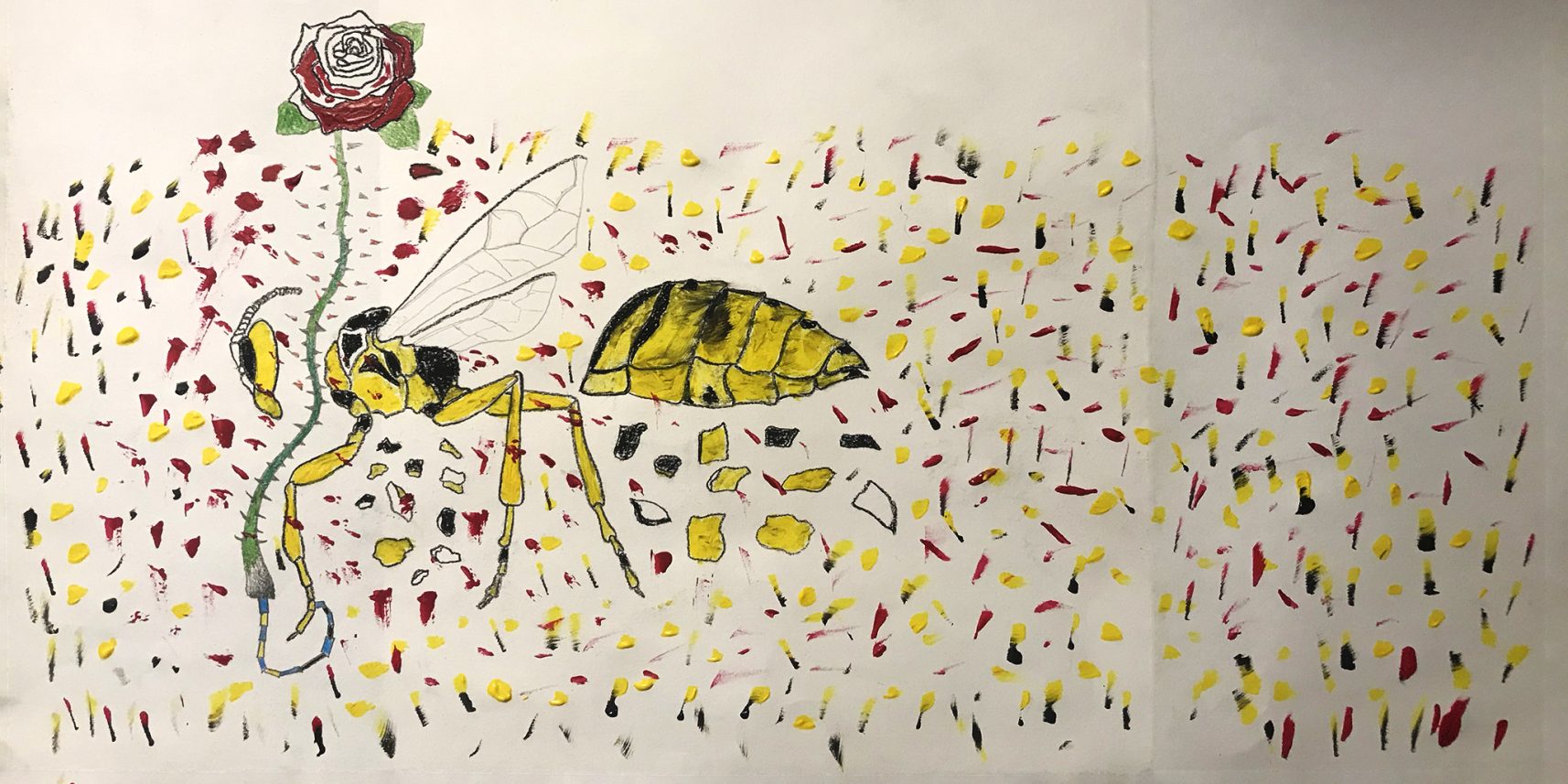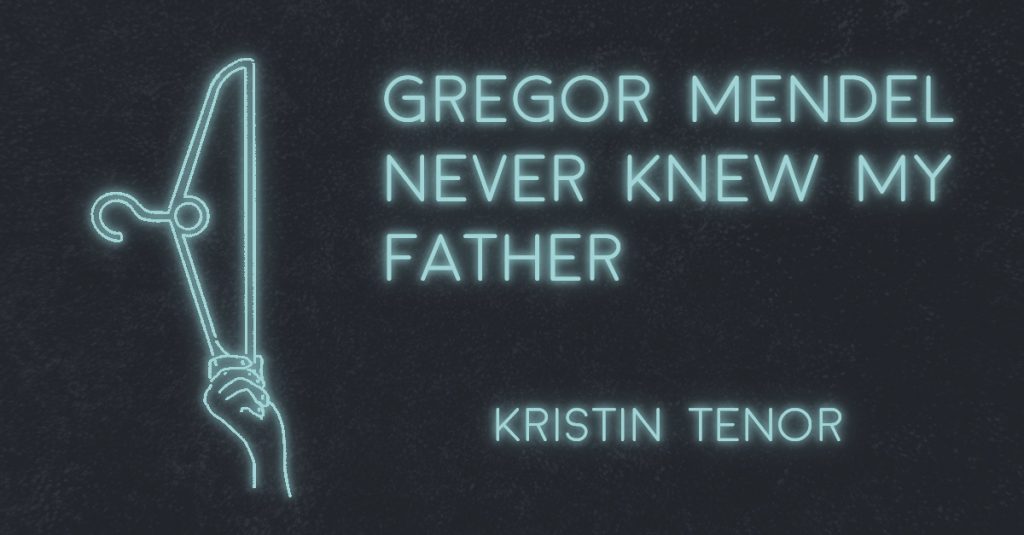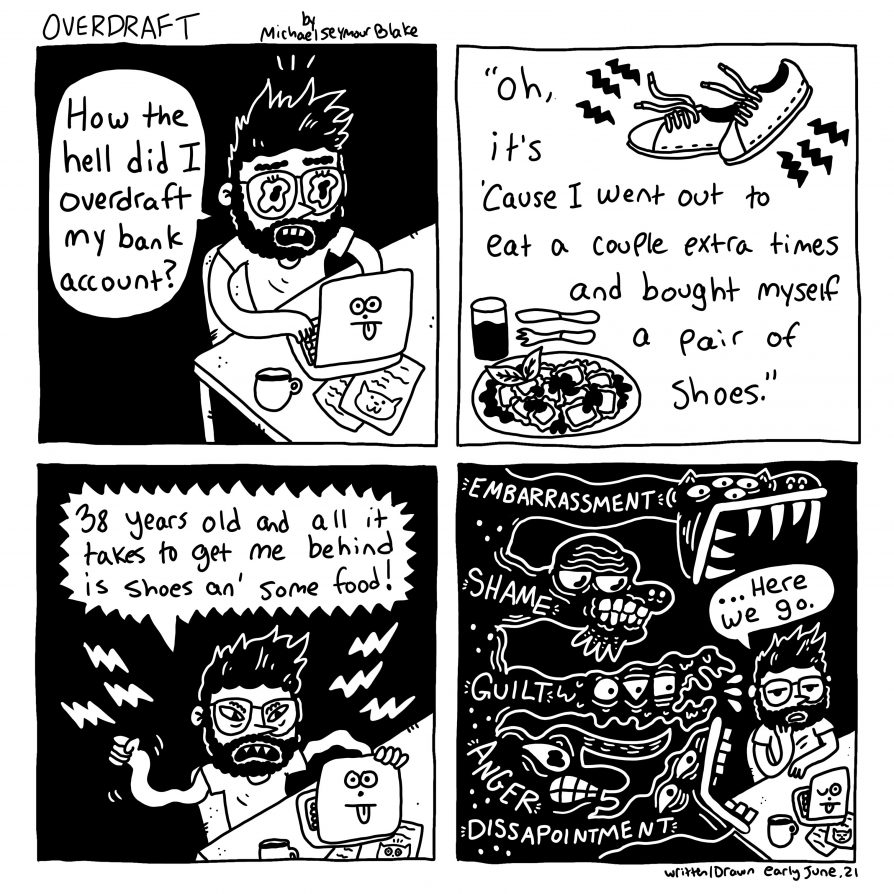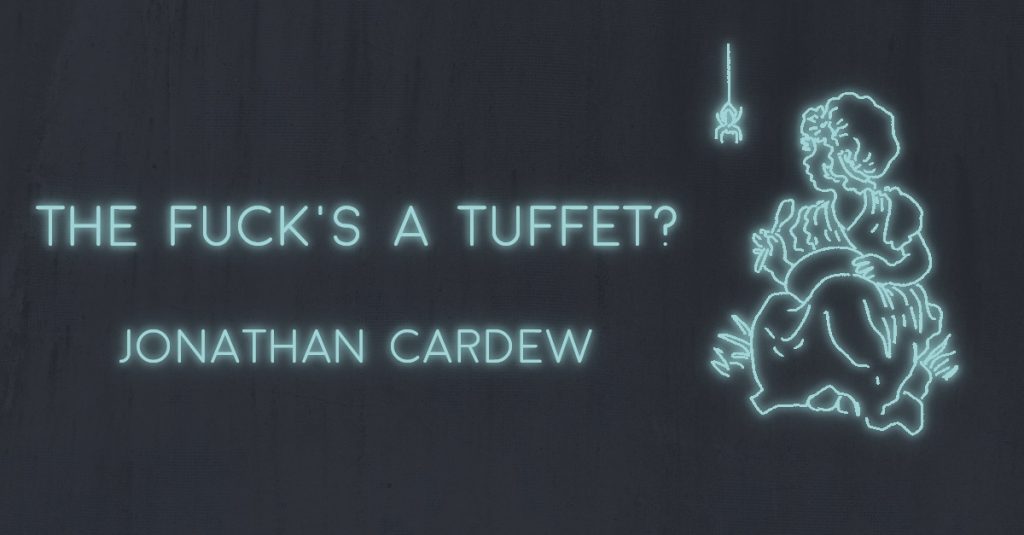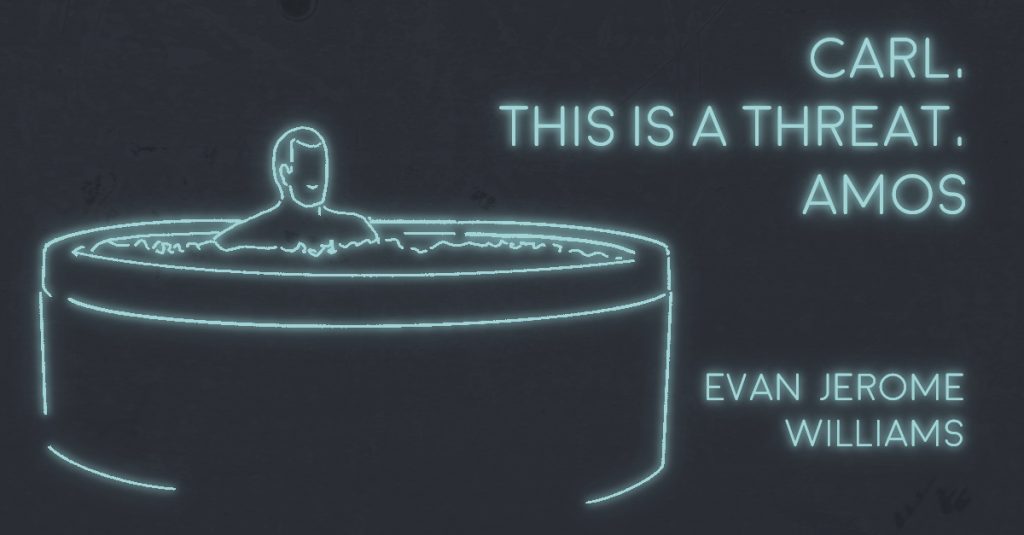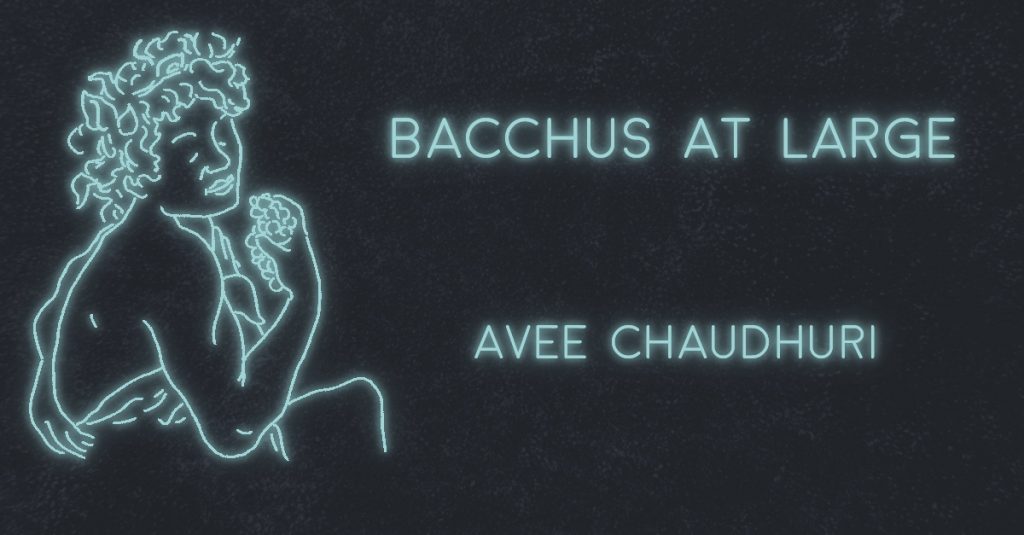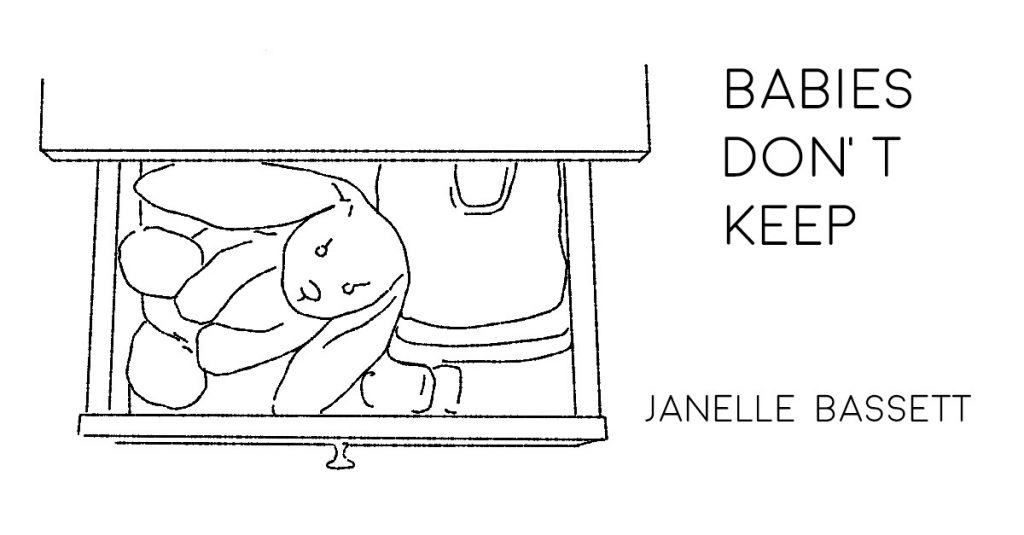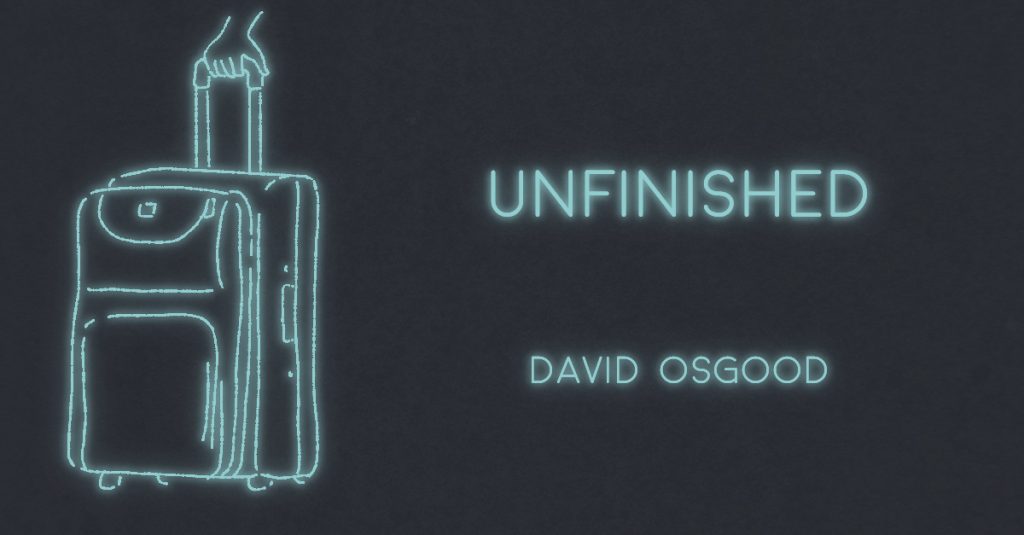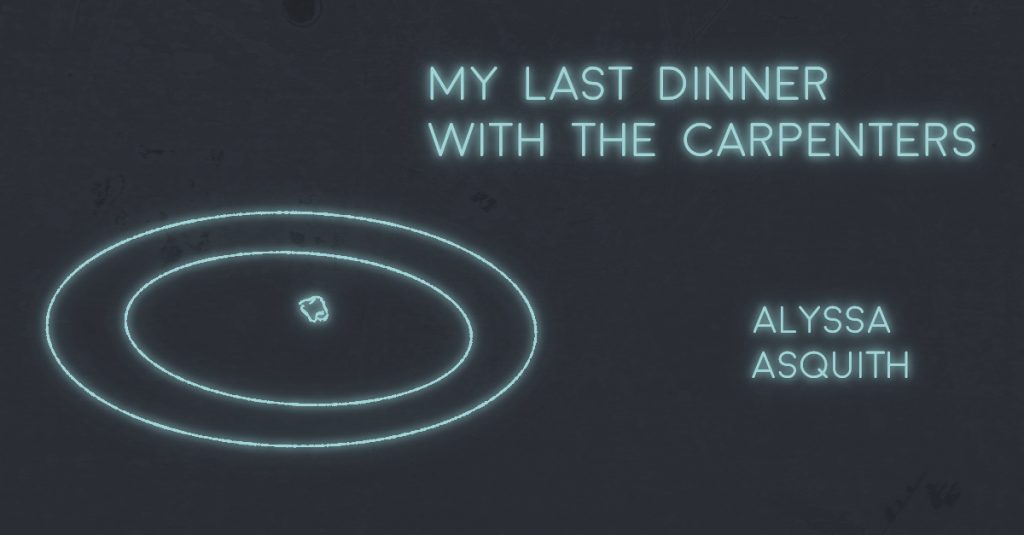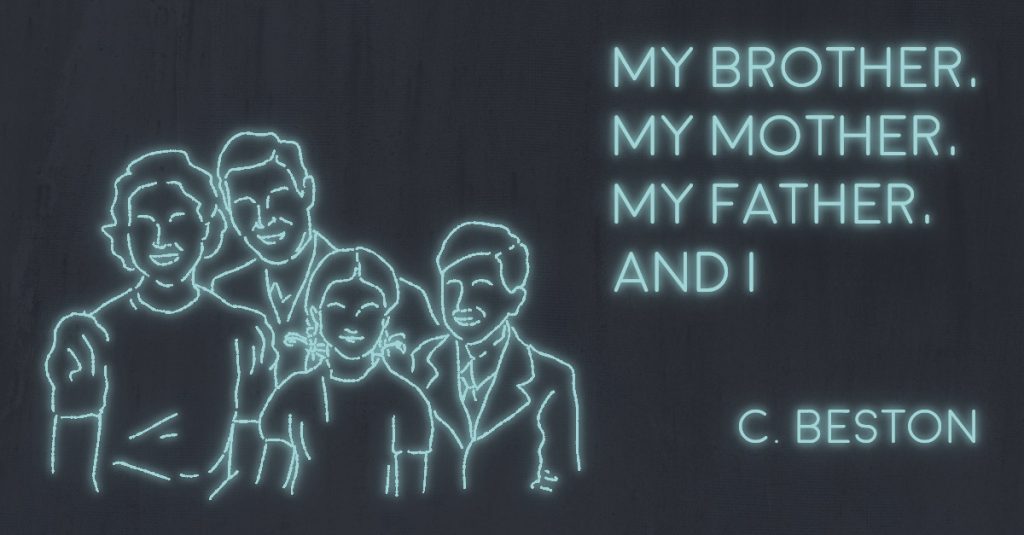I packed my blue kiddie-sized suitcase that said “Off to Grandma’s House.” In went the socks that I liked to roll down into ankle worms. In went the hairbrush with my spelling bee name tag stuck on the handle to claim it as mine—just like the dark greasy hair wound through it.
Usually the suitcase referred to my dark-haired Grandma, because that's where I took it. This time I was packing for a trip to my red-haired Grandma’s, but the suitcase was still right about where I was headed.
I put in a wax air freshener shaped like a teddy bear. The bear wore blue jeans and I’d melted his head into his shoulders with a lamp light. I meant to—had wished for a real flame and quicker dripping. The bear was a victim but still smelled like sea breeze. I always sniffed my victim before going to sleep. Routines were secretly holding me together.
I hoped my mom would pack a bag for my sister. Without help, her bag would be only Tootsie Rolls, trolls, and hard objects for pelting me when I most deserved it. No underwear, just projectiles.
I finished packing my suitcase hours before I was to be taken anywhere. I sat on my bed with my shoes buckled and looked in the mirror and saw the kind of girl who packed her bag hours early and then put on her shoes and looked in the mirror and watched herself pat-pat her bag to make sure it was staying ready.
I watched Grandma pull up through my sheer curtains. She parked her tan Buick, put her purse on her shoulder then, remembering she was in a small town where purse snatchings were rare and she could acquire her granddaughters for free, set her purse back down.
My mom let me open the door. Grandma was no longer her mother-in-law, so Mom was under no obligation to smile, coo, or offer her pigs-in-a-blanket when she came around. Mom put out her cigarette and put both feet on the floor—she no longer needed to impress but that didn’t mean she wanted to be caught all bunched up and puffing away.
“Look at you, all ready to go! I guess you didn’t have time to brush your hair. Where’s your sister?”
Grandma stood there fragrant and put together, masterfully middle-aged. She was the only person in my life who wore outfits and not just clothes. This gave her a certain authority over my hair. Her go-to look was bright multi-colored tops tucked into solid slacks, plus jazzy belts, beaucoup jewelry, a crisp hairdo, shoulder purse and foo-foo perfume. She had a high slim waist and it seemed like her whole past and future revolved around that fact—her middle being so easy to locate.
Grandma looked past me and saw my mom sitting up straight and not on fire. “How are you doing, Mandy?”
Mom said she was “getting along fine” but did not offer examples of her fineness or ask any questions in return. Instead she got up to see what was keeping my sister from getting this woman off her porch.
I was telling Grandma that I’d packed a swimsuit just-in-case when we heard yelling.
“It’s time to go. Right now!”
“I want to bring my (unintelligible)!”
“You can’t! It doesn’t fit in your bag! Just take everything from inside and pack it. Same thing.”
Grandma and I heard a scream that started upright then dropped to the floor. Then we heard the crunchy brown carpet take some abuse from Tara’s fists and heels. I thought good. That carpet deserved it.
I bet Grandma wished she had her purse to look through while she stood through this tantrum—she could have feigned gum-rifling to break the tension.
I told her, “I better go see what’s going on.”
She looked in at our couch and said, “I’ll guess I’ll wait in the car.”
When I walked in Tara was still pounding and my mom had her face in her hands. Mom saw me and offered, “She wants to bring her entire drawer.”
Tara stopped moving and crying so that her justification wasn’t coming from an out-of-control animal. “I need to bring it because Chomp-Chomp sleeps in there. It’s her bed!”
Chomp-Chomp was my sister’s stuffed rabbit who I’d never ever seen sleep anywhere other than in Tara’s twin bed, in the crook of her arm. I said, “Why can’t she bring the drawer?”
“Because… it’s part of the dresser.”
“We will bring it back.” I made it into a “we” situation, like the idea was gathering momentum. Practically everyone thinks bringing the whole drawer is a reasonable idea.
Tara looked at me to forgive me for about twenty percent of how I’d treated her up until that moment. I had to keep her tipped slightly toward me with these moments of understanding so she didn’t hit me too hard when she hit me too hard.
Mom said, “It’s heavy. And what would your grandma think?”
From the floor Tara watched to see if I was pulling for her strong enough to get past the next, logistical hurdle.
“We’ll tell her it’s a Reed family tradition—that your family has traveled with their dresser drawers for centuries. One guy started it and then that became the way it was done. Like how Johnny Appleseed’s descendants probably still wear pots on their heads.”
Tara put her ankle on her opposite knee and said “Yeah” like she’d just been taking a casual floor rest or doing a yoga pose and not wigging out about a detachable piece of furniture.
Mom must have realized how close she was to being free from us for two days. “Fine. But I’m not carrying it out to her car. You two will have to manage.” She gave us each a kiss on the cheek, went into her room, and shut the door.
As Tara and I lugged the dresser drawer across the lawn we remarked conspiratorially on how light it was, really, and how well Chomp-Chomp would sleep in the city. Grandma popped the trunk without comment. We didn’t even have to tell her about the Reed tradition, she could tell by our unkept hair that we came with a fair amount of straggly reasoning.
***
Tara and I rode in the backseat because Grandma had plastic shopping bags in the front and didn’t offer to move them. Also, we needed to be close enough to fight and huff at each other without getting neck cricks.
Grandma never asked about school or friends or if we’ve been nice to Mommy. She wanted to spend time with us, not with a five- and a seven-year-old. She knew our day-to-day lives were boring struggles and that nothing that happened at school was worth sharing, so instead she told us about her life.
I was glad I didn’t have to produce answers like, “Yes, my teacher is very nice, she grades in green instead of red” but I did want to tell someone about getting under my desk for earthquake drills in my dress and how the cold concrete floor felt on my underwear when I leaned back into a full crouch. And about my daily work digging out tree roots at recess. Every day I exposed more tendrils and every day I became less articulate.
Grandma told us about selling high-end stuffed animals to rich children and the parents who wanted to shut them up, and about her new dummy cat who tried to sleep on the wrought iron headboard but kept falling into the crack between the bed and the wall with a squawk that must have meant “I thought this time would be different!”
I filed away all this incoming information. I looked like a blank incapable child who might sit watching houseflies, but I was a Rolodex in cotton tights. These stories were clues and demonstrations I might need someday when I learned how to be a person.
Tara looked out the window. This made me furious. I wanted to hurt her so that I didn’t have to think about how she saw the world when I was busy with my own investigation.
I whispered to her, “You smell like the dog when she first wakes up.”
She frowned, hurt and small, and tried to kick me.
Grandma said, “Stop that fighting or you won’t get to see what’s in these bags.”
Tara stopped so I gave her a victorious look because even though we both stood to gain from the bags she had already sustained my critical comment while I remained unkicked.
Tara told Grandma that we’d each gotten a puppy from a neighborhood litter. Spunk, the puppy she’d chosen, was still alive and chasing cars while the dog I’d chosen, Lucky, was killed by a car just as soon as I’d named him. Tara said, “Isn’t that kind of funny? Lucky?”
And Grandma laughed because it was kind of funny when you weren’t the owner and the namer of the unlucky pup.
So Tara kicked me back without compromising the bag of goodies, and while I stewed about the comedic, deflating death of my pet I was also relieved that my sister had tipped us back to even. I did my best damage in retribution.
***
We’d been driving for two hours when we stopped at a gas station. Grandma needed to fill up and said we could get a snack, which meant candy because we weren’t the kind of girls to walk out with a bag of pretzels.
Tara and I stayed in the car while Grandma pumped. We wordlessly watched Grandma push buttons while the back of her belt sparkled for us. When she turned around with the nozzle she tapped it on the window, like a fun-loving warning. Give me a smile with your hands up where I can see ‘em.
Inside the gas station I found the candy aisle and decided to get Sixlets which are like rounder M&M’s, with even more of that factory-made taste (bouquet of dye with notes of clanking).
Before I could finalize my choice by swiping it off the rack, I saw a man in the next aisle. He was in the salt aisle: chips, peanut butter crackers, jerky sticks, mixed nuts. He held a bag of Funyuns and I recognized him immediately. If I hadn’t been with my Grandma I might not have made such swift connections. I might have thought, “Bus driver? Farm hand? Yoyo’s Pop-Pop?” But in that context I easily remembered that he had once been my low-level, temporary, menacing Grandpa. An image of him reclining on the couch leering and sneering in pajama pants made my stomach grasp at my inner-skin for balance and composure.
I froze and tried to understand the implications of this sighting and whether I wanted to be recognized by this man. I scanned for Tara. She was safe with Grandma and the cold drinks. I considered army-crawling to them but I knew the Sixlets would make me a conspicuous rattlesnake.
He hadn’t noticed me yet. Then I recalled how unremarkable and forgettable a child I was. People never remembered me. I had to be formally introduced to my great-grandmother each holiday and every picnic. I could probably do a cha-cha dance with several packages of Sixlets and this past-Grandpa wouldn’t even look up.
This was a relief. This Grandpa had, for a brief time, been the partner of my red-haired Grandma who was now only feet away with the cold drinks. I didn’t know if they had been married or simply boyfriend and girlfriend, but I think they lived together. His razor and comb had been in her bathroom with her seashell art and her round cakes of pink soap.
I’d only picked up slivers about their relationship. From listening to adult conversations I’d learned that he’d been stealing from Grandma and had done the same with other women, that he’d pushed a girlfriend down concrete steps, that he’d gone by other names, that he was bad inside—wanting and taking. All while smelling of sharp pine. But the final point of all the gathered slivers was this: she’d gotten away from him.
Until then. When he loomed one aisle over with his Funyuns.
I wanted to sound an alarm and be an alarm. I didn’t want to be unremarkable but ultra-remarkable, like a swirling flame that screams in beeps.
“Hey! Hey you! You’re my grand baby! Aren’t you my little grand baby?”
He was looking over and down at me, identifying me correctly. Except I was never his and he knew me from ages five to six, when I could read and shower alone and wear bodysuits—so not a baby.
I decided not to speak but to cower. So much for being an alarm, for swirling in response to danger. In the heat of the moment I was all prey, all rabbit, begging for mercy only with my eyes.
“You are my grand-baby ain’t ya? You’ve grown. You’re gettin’ lady legs!”
He was leaning on the rack between us and studying me like his eyes were the sun and I grew into a woman only under his edifying watch. I didn’t know he was drunk but I knew he was loose in a way that meant anything could happen. And that the “anything” felt tipped toward bad and toward irrevocable.
He knew I was scared and this only brightened his beam.
I heard my grandma’s shoes tipping across the store. I saw her approach, looking only right-at-me because she’d had previous experience with his mean and binding focus.
She stopped at the entrance to my aisle. “Come on over here.”
She was my well-dressed embassy.
Tara was at her side, looking frightened and like she forgave me for another twenty percent of my awful behavior because she disliked seeing me in a vulnerable situation.
“Well, looky here. Pretty Miss Dreena. Here with our grandbabies. Looking so nice.”
Grandma didn’t acknowledge him or meet his eye and I understood all the strength she had in her—her strength in that moment and in the moment she finally kicked him out. I understood her strength in the moments I couldn’t imagine, like what bad men did when they had the chance, and moments I wasn’t privy to, moments from before I was born, like when she was ten and a neighbor boy pushed her down, lifted her skirt, and stood over her because he wanted her to know he could do more if he felt like it. In that moment her strength kept the truth of that powerlessness from penetrating her being.
I took my Sixlets and went to Grandma. She held my hand and led us to the checkout. She looked straight ahead but Tara and I were weaker and watched him following us.
“Where are my three beautiful girls heading tonight?”
Two people were in front of us in line. Grandma gripped our skulls and turned our faces away from him.
“Where are you taking my grandbabies?” His voice was becoming more threatening and more cajoling.
I started to cry. It felt like he could do whatever he wanted since he’d claimed me as his. His grandbaby.
Grandma pulled me into her hip. We were next in line.
Tara saw my tears and turned back to yell, “We are not your grandbabies! And you smell like your dog when she first wakes up!”
He laughed and he came closer, both actions that made the tears come harder.
Grandma had to yank the Sixlets from my upset hand to pay for them.
He was right beside us, nearest to me. He called Grandma’s name. He called her “the little wife.” He asked where we were going over and over.
The woman behind the counter said, “Is there a problem here?” and I wanted to scream an affirmative and scramble behind the counter with her, back with the telephones and the guns and the propriety.
But Grandma very coolly said we were fine and closed her purse and handed us our candy.
She said to us, “We are going to walk to the car and drive away.”
I just knew he’d follow us and scratch at my window until he saw that none of my haughty confidence remained. I knew he wanted to put his yellow teeth in my face and feed off my disgust.
But once we started toward the door he stopped shouting and simply let us go. We got in and we drove away, just like Grandma said. I looked out the window at the gas station. He hadn’t emerged. He wasn’t chasing us.
We were not his grandbabies.
As she pulled back onto the road Grandma asked, “Are you girls okay?”
As Tara said, “No” I said, “He didn’t even remember my name.”
